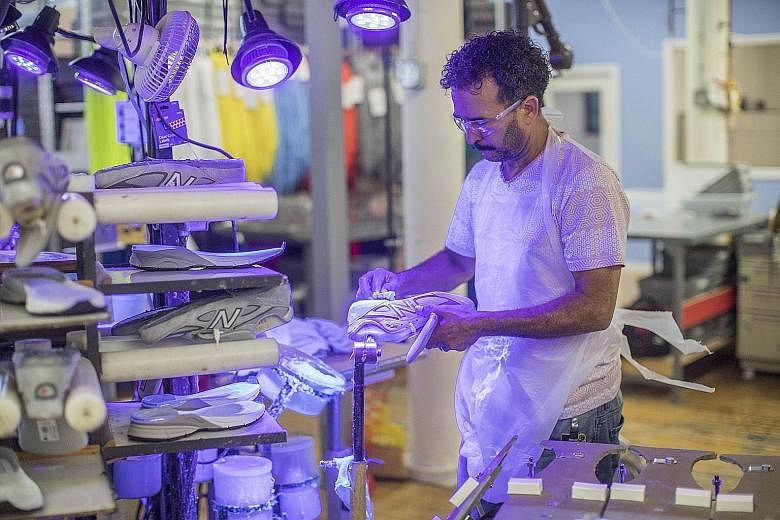By nearly every standard measure, the United States economy is doing well - and better than it was 11/2 years ago, before Mr Donald Trump was elected president. If only the debate over who deserves most of the credit were as easily judged. Americans' perceptions of the economy's prospects increasingly depend more on their political identity than statistics on output or stock markets.
So each new economic report - whether the latest monthly job figures or the quarterly growth estimate - reignites the feud between Trump supporters and critics. The same gauges that illustrate this administration's economic successes also make clear that they are built on the achievements of the previous one, and that the economy is following the upward trajectory begun under president Barack Obama.
In the 18 months before Mr Trump moved into the White House, 3.7 million jobs were created, seven in 10 Americans said they were doing fine or living comfortably and the economy grew. In the 18 months since, 3.4 million jobs were created, seven in 10 Americans said they were doing fine or living comfortably and the economy grew. Stubbornly slow wage growth and wide income gaps have spanned both periods.
Economists are quick to point out that presidents of both parties are assigned more credit or blame than they deserve for the economy, a colossus whose course is fashioned, bit by bit, from innumerable decisions made every day by investors, consumers, managers and merchants around the globe.
Even so, Mr Trump - through a combination of skill and circumstance - has been better able than his predecessor to spotlight the economy's gains, political scientists say.
And his message never varies, no matter what the numbers show: an economy that was ruinous under Mr Obama is "amazing" under his own leadership.
The salesmanship seems to have had an impact. Business and consumer sentiment is higher than before the election, and the share of the public that says the economy is improving has grown, according to Gallup surveys.
At the same time, however, both presidents have had trouble transforming their economic successes into more general support.
For presidents as far back as Dwight Eisenhower, Mr Obama is the only one whose approval ratings fell as consumer sentiment rose, said Dr Lynn Vavreck, a professor of political science and communication at the University of California, Los Angeles, and a co-author with John Sides and Michael Tesler of a coming book on the 2016 presidential campaign.
And although it's still early, Mr Trump looks to be headed in the same direction, Dr Vavreck said. Sunnier views of the economy have so far failed to raise Mr Trump's approval rating above 50 per cent.
What Mr Trump has been particularly well positioned to do, though, is identify himself with economic success. He made his name as a celebrity tycoon. "It dovetails with a narrative about Donald Trump that has existed for a long time: that he's a businessman, that he understands the working of the economy, that he knows how to make money," said Dr Mark Rozell, dean of the Schar School of Policy and Government of George Mason University in Virginia.
Circumstances have also provided Mr Trump with a tailwind. He has benefited from an additional 11/2 years of economic growth, which compound the perception of the economy as resilient. The nine-year expansion has endured in the face of disruptions - from a global slowdown to trade tensions and unpredictable policy pronouncements.
Even if individuals are unaware of most details, the high confidence scores reflect the collective evidence and evaluations that the economy is hardy, said Dr Tyler Cowen, an economist at George Mason University. "Markets aggregate information," he said.
The extended recovery is naturally digging deeper. Early this month, the Labour Department reported that joblessness fell to 3.9 per cent in July, near the 18-year low it reached in May.
The least educated workers - who have received the smallest share of the recovery's rewards - were hired in greater numbers, while traditional industrial sectors like manufacturing that have suffered from decades of losses, added jobs.
Steep corporate tax cuts have raised longer-term worries about bloated deficits, and an anti-regulatory stance troubles watchdogs who warn that health and safety risks will increase. But in the short term, those actions have temporarily quickened the pace of growth, pumped money into the economy and buoyed business confidence. Republicans - led by the President and his Twitter feed - have relentlessly reaffirmed his economic message with superlatives, capital letters and exclamation points.
But the net effect has been to outshine the economy's weak spots, like sluggish wage growth, income inequality and the erosion of middle-class jobs - factors that contributed to Mr Trump's election and still exist. The Democrats were less adept at rounding up credit for economic improvements and shaking off criticisms. "Part of Obama's problem, especially in the last year, was that he was too understated," said Dr Larry Sabato, director of the University of Virginia's Centre for Politics. "In every instance, he downplayed it. It was 'Just the facts, ma'am'. That doesn't work any more."
NYTIMES

